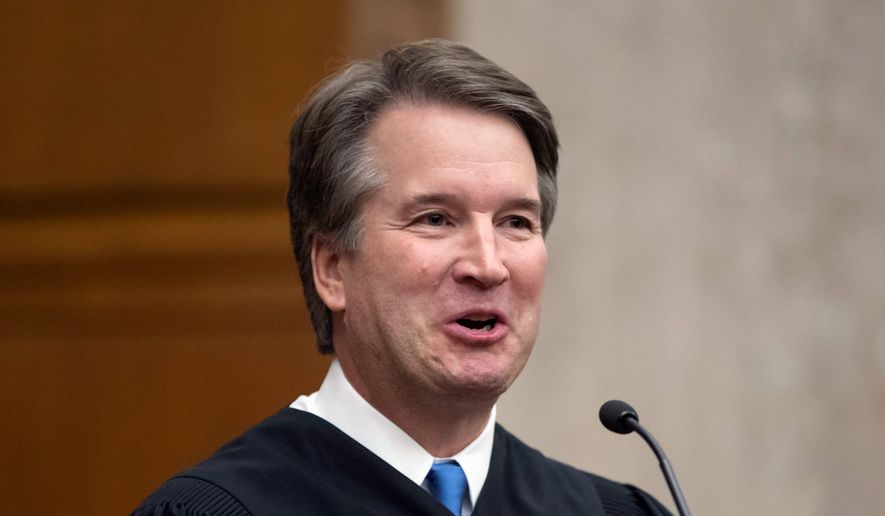With attempts to attack Judge Brett M. Kavanaugh’s record failing, Democrats over the weekend mounted a last-ditch bid to derail his confirmation to the Supreme Court by claiming that the vetting process is so bad that it demands a do-over.
Senate Minority Leader Charles E. Schumer, New York Democrat, even accused former President George W. Bush of complicity, saying he used his powers to block access to tens of thousands of pages of records from Judge Kavanaugh’s time in the Bush White House.
Republicans brushed aside the complaints and prepared to welcome Judge Kavanaugh to Capitol Hill on Tuesday for his appearance before the Senate Judiciary Committee, where the fate of his nomination will be decided.
Sen. Lindsey Graham, South Carolina Republican, said as long as Judge Kavanaugh doesn’t bungle the hearings, he will be confirmed with some Democrats joining Republicans.
“If he does well at the hearing, he will get — my belief — 55 [votes]. Or higher if he does well, and I’m sure he will do well,” Mr. Graham said on “Fox News Sunday.”
Democrats seemed to realize they are fighting a losing battle after attacks on the judge’s personal finances and his activities while in the Bush White House fell short.
SEE ALSO: Lindsey Graham predicts Judge Brett Kavanaugh will be confirmed with at least 55 votes
Sen. Amy Klobuchar, Minnesota Democrat, expressed remorse that her party eviscerated the power of the filibuster five years ago, leaving them no path to stop Judge Kavanaugh, barring Republican defections.
Ms. Klobuchar, who voted with fellow Democrats in 2013 to trigger the “nuclear option” and curtail the filibuster, said she would support reverting to the 60-vote rule should her party regain the Senate.
“I don’t think we should have made that change when we look back at it. But it happened because we were so frustrated because President Obama wasn’t able to get his nominees, but I think we would have been in a better place now,” she said on NBC’s “Meet the Press.”
She was one of several Democrats who lodged complaints over the weekend that Mr. Bush and President Trump were keeping damning documents from Judge Kavanaugh’s past secret.
Nearly 450,000 pages of records have been turned over so far to the Judiciary Committee — equivalent to the total for the past five high court nominees combined — yet Democrats say Mr. Bush and Mr. Trump have deemed more than 100,000 pages “committee confidential.”
“What are they trying so desperately to hide?” Mr. Schumer said.
Republicans said Democrats are reaching for objections.
No land mines have been found in the hundreds of thousands of pages already available to the public, and Republicans said they have made the confidential documents available to all senators.
Sen. Charles E. Grassley, Iowa Republican and Judiciary Committee chairman, said he would work with any senator who requests that some of those confidential documents be cleared for the public.
Ms. Klobuchar was the only senator to make such a request, he said — and those documents were released Friday. They showed a fascinating conversation in March 2002 between Judge Kavanaugh, at the time a White House lawyer, and colleagues about the constitutionality of campaign finance laws as Congress was debating a bill pushed by Sens. John McCain and Russell D. Feingold.
The judge was deeply skeptical of Congress’ ability to impose restrictions, calling limits on outside groups “blatantly unconstitutional” — a position the Supreme Court eventually took as well when it struck down the restrictions.
He also said that limits on contributions to candidates “have some constitutional problems.”
That stance is likely to anger Senate Democrats who want more campaign finance restrictions, arguing that rich donors have gained too much influence in politics through their ability to fund outside groups that run ads influencing elections.
In the emails, Judge Kavanaugh is debating Helgard C. Walker, another lawyer in the White House, with Noel Francisco also included in the conversation. Mr. Francisco is currently the solicitor general for the Justice Department, and Ms. Walker is a lawyer in private practice.
Ms. Walker and Judge Kavanaugh appeared to think restrictions ran afoul of the Constitution, though they got into an intense email discussion over the role outside groups play in campaigns.
Judge Kavanaugh said issue ads from organizations such as the Chamber of Commerce or the Sierra Club can overwhelm the candidates, and the candidates are at a disadvantage if they have to abide by limits while the groups don’t.
“I agree that the issue ad restrictions are blatantly unconstitutional — although I think the policy goal of allowing the candidates to debate each other without background noise that overwhelms the candidates/campaigns themselves is quite laudable (albeit unconstitutional),” he wrote.
Ms. Walker said Judge Kavanaugh was demeaning outside groups by calling their voices “background noise.”
Judge Kavanaugh said he wasn’t trying to insult those voices but did fear that they could be too loud for the campaigns to break through.
“I do not like a political campaign that is Sierra Club against Chamber of Commerce with the candidates reduced to bit roles because of contribution limits,” he said.
The McCain-Feingold legislation, which Mr. Bush eventually signed into law, imposed strict limits on how political parties could raise and spend money, and tried to limit the ability of outside groups to weigh in with ads during the days ahead of the elections.
The Supreme Court upheld most of the law in a 2003 case, but seven years later, in the Citizens United case, it ruled that the restrictions on outside groups were unconstitutional — just as Judge Kavanaugh predicted.
That left a situation where parties are still heavily restricted, but conservative and liberal groups are not — and they have become an overwhelming force in campaigns, also as Judge Kavanaugh predicted.
• Stephen Dinan can be reached at sdinan@washingtontimes.com.
• Valerie Richardson can be reached at vrichardson@washingtontimes.com.




Please read our comment policy before commenting.